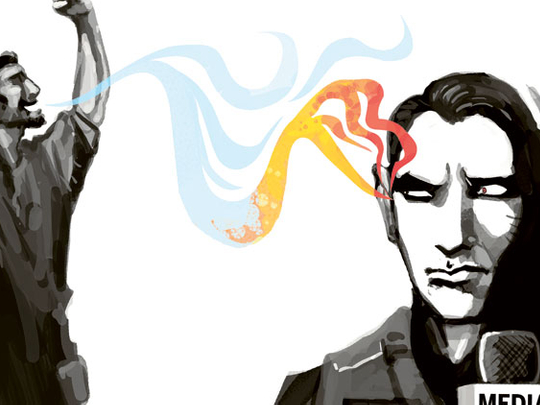
It is incumbent on those of us who are fortunate enough to straddle more than one culture to use whatever knowledge they might have to explain, but not necessarily justify, the one to the other, because only through knowledge and understanding will mutual respect and peace prevail.
For me as a physician, it has always been fascinating to observe human behaviour and facial and verbal expressions. Like millions across the globe, I watched hours and hours of the Libyan armed conflict on TV. There was one recurrent verbal refrain: Allahu Akbar, literally ‘God is greater', repeatedly screamed by gun-firing rebels in the heat of battle.
In the past few days, while watching video clips of the brutal massacre in the city of Homs at the hands of the Syrian tyrant Bashar Al Assad, how many times have we heard the same expression immediately after a bomb landed on a home. Many times I would also hear Allah Akbar alaik ya Bashar, which simply reminds the president that although he can cause so much death and destruction, in the end, ‘God is greater than you, Bashar'.
In the Muslim world the call to prayer occurs five times a day. Within each call, of roughly a minute's duration, the phrase Allahu Akbar is repeated six times.
Nothing sinister
Why does the fighter scream it so frequently? It is a form of thanks and acknowledgement that what has just been achieved, such as vanquishing some of Muammar Gaddafi's troops, and surviving to tell the tale, was possible only because Allah willed it or allowed it.
One would also use the exact same expression at some other great miraculous event, such as the birth of a baby, especially after a difficult labour. If the trapped miners of Peru were in Libya or Syria, the same shout would greet them as they reached the surface.
Another expression that might be used is Ashhadu an la ilaha illa Allah, literally ‘I declare that there is no god but Allah'. That is what Gaddafi uttered when he found himself surrounded by rebels, and realised that his life might end within seconds. He could equally have shouted Allahu Akbar as a farewell message to this world.
Clearly, the Libyan resistance fighters are not terrorists by western standards despite repeatedly uttering that phrase. And even more clearly, Al Assad's victims cannot possibly be accused of being terrorists.
And yet how many times have we read or heard a correspondent, reporting from Pakistan or Afghanistan, say "... the Taliban has not claimed responsibility for this attack which killed ... people; but the suicide bomber was heard to shout Allahu Akbar as he detonated the bomb in his belt", a sure, very simplistic implication that he must be a terrorist.
Afghan scenario
Fast forward to 2014.
The International Security Assistance Force in Afghanistan has gone home. The Taliban opposition to President Hamid Karzai, a dictator and a lackey of the US, as far as they are concerned, is mounting a military campaign against his newly formed and heavily armed troops. Their ‘freedom fighters" are ambushing a platoon of Karzai soldiers, while screaming Allahu Akbar!
If terrorism is, by definition, killing or maiming innocent civilians, then how can that act be called terrorism? And yet, that is exactly what many in the western media will label such attacks.
Let us therefore, whenever possible, educate our fellow men who are not fully aware of other nations' cultures, that the expression Allahu Akbar is no more terroristic or sinister than the expression I hear several times a day in my own city in Canada, namely Jesus Christ! as a form of exclamation.
Yes, it is true that a suicide bomber would also utter it immediately before detonating his belt, but is that not the same as the screams of American soldiers, invoking the name of God, while rushing up a hill through a hail of machine gun fire during the Korean War, for instance?
When are we ALL going to try to understand the feelings, the fears, the aspirations and the cultures of the other?
Dr Qais Ghanem is a retired neurologist, radio show host, poet and novelist. His two novels are Final Flight from Sana'a and Two Boys from Aden College. He lives in Canada.








